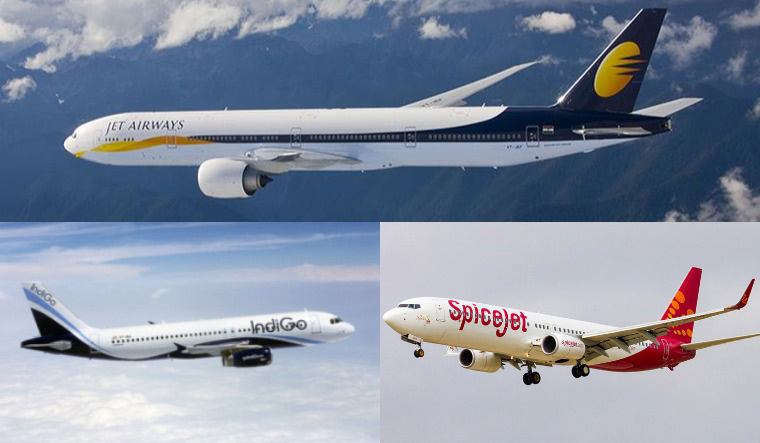With lenders reluctant to provide emergency funding to cash-strapped Jet Airways, the airline is staring at a shutdown, at least temporarily. Once the country’s second largest carrier in terms of market share and a fleet of around 120 planes, it is now left with less than 10 planes. Rival airlines like Indigo and SpiceJet are cashing on Jet’s troubles, adding new services and inducting more airplanes.
India’s largest carrier Indigo, for instance, is starting additional services between Mumbai and Delhi. Separately, it has also announced six new flights, including four new routes under the regional connectivity scheme, effective June 22 to enhance connectivity to and from Kolkata, Allahabad, Raipur and Jabalpur.
READ: Jet Airways' troubles mount; rivals to get a boost
SpiceJet, on Tuesday, said it would induct five more 90-seater Bombardier Q400 aircraft. It is also taking 16 Boeing 737-800 NG aircraft on dry lease.
Much of Jet’s fleet, which largely comprised Boeing 737 planes, has been grounded by lessors, due to non-payment of rentals. The lessors had already approached Directorate General of Civil Aviation to de-register some of them. Last week DGCA had announced that it had de-registered seven Boeing 737-800 aircraft of Jet Airways, so that lessors could then lease it to other airlines.
The expansion undertaken by SpiceJet is part of its plans to augment capacity and minimise passenger inconvenience, said Ajay Singh, chairman and managing director of SpiceJet.
“The sudden reduction of aviation capacity should in no way hamper air connectivity to the smaller towns and cities of India and as the country’s largest regional operator, SpiceJet will make all possible efforts in this direction,” said Singh.
The airline had last week announced six new domestic flights connecting Mumbai with Kolkata, Chennai and Varanasi.
Effective end of May, SpiceJet will also start new direct international flights to Hong Kong, Jeddah, Dubai, Colombo, Dhaka, Riyadh, Bangkok and Kathmandu. Jet was the only Indian carrier to earlier fly on some of these routes like Mumbai and Hong Kong.
READ: Jet Airways: Goyal opts out from bidding; Suresh Prabhu calls for review meeting
Metro airports like those in Mumbai and Delhi are already congested. With Jet’s services largely curtailed, the airport operators will also be eyeing those vacant slots, which could be allotted to other airlines.
“As slots at some of the key airports earlier allotted to Jet Airways remain unutilised, (airports are the eventual owners of the slots) airport operators, too, have quickly moved to allot such slots on a temporary basis to other airlines,” said Santosh Hiredesai of SBICap Securities.
Interestingly, the last time slots were temporarily made available was when SpiceJet was on the verge of collapse back in 2014, and earlier when Kingfisher Airlines was going down in 2012-13. While Kingfisher crashed, SpiceJet was steered out of turbulence by Ajay Singh, one of its early promoters.
SpiceJet can gain in several areas from Jet’s troubles. Like Jet, SpiceJet operates a fleet of narrow body Boeing 737 planes and could thus be well placed to capitalise on the current situation, say analysts.
also read
- IndiGo CEO Elbers: Airline estimates 11.2 crore passengers in 2024, up 12 per cent
- Akasa Air CEO Vinay Dube: Carrier financially ahead of plans, looks to add more aircraft in fiscal 2024-2025
- How safe do you feel on flights in India?
- Jet Airways: From major Indian private air carrier to bankruptcy and liquidation
Similarly, trained pilots are type rated for a particular model and need 6-8 months training before they are certified by DGCA to fly a different type of aircraft. SpiceJet “could also find it easy to absorb the existing workforce (pilots, engineering and ground staff) and quickly deploy these planes to lock-in slots/bilaterals,” added Hiredesai.
In recent months, airfares in India have gone up due to the reduction in Jet’s capacity. This will boost the yields of other airlines, including SpiceJet and Indigo.
“Indigo would benefit more than SpiceJet over the fares increase, as it has more exposure to the metro routes where fares have gone up sharply, owing to Jet Airways financial woes,” noted Gagan Dixit, analyst at Elara Capital.
Dixit expects both Indigo and SpiceJet to report a profit of Rs 67.3 crore and Rs 28.7 crore respectively, excluding foreign exchange impact, in the January-March quarter. On the other hand, Jet could report a loss of Rs 600 crore, Dixit added.
Shares of Indigo and SpiceJet have gone up recently, inching closer to their 52-week highs, as investors expect them to benefit from Jet’s woes. On Tuesday, Indigo’s parent InterGlobe Aviation soared 7.4 per cent to Rs 1,583.15. SpiceJet zoomed 11.2 per cent to end at Rs 132.70. On the other hand, Jet shares crashed near 19 per cent, before reversing some of its losses to close at Rs 241.85, still down 7.6 per cent. Equity markets are closed on Wednesday on account of Mahavir Jayanti.



